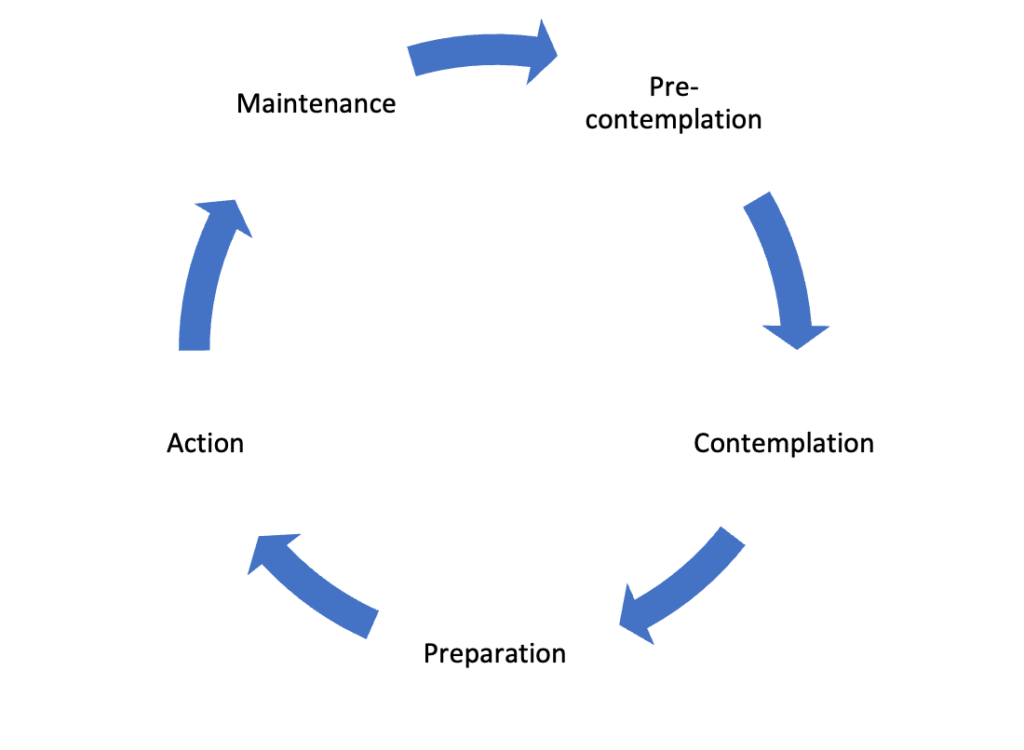In this second part of the blog on the stages of change, a few techniques are presented to help you progress from one stage to another or support a loved one going through a process of change. However, note that returning to a previous stage is not a failure. Maybe it can be seen as a reminder that more work had to be done in this previous stage before progressing to the next stage. Humans are constantly changing and adapting to external and internal situations; therefore, it is normal that our motivation also fluctuates.
- Precontemplation: At this stage, as you may not be aware that the behaviour is problematic yet, it can be helpful to start by simply evaluating it and thinking about what you want or need. In other words, we want to develop a more conscious awareness of the behaviour.
- How to help someone during the precontemplation stage:
- Offer support and active listening.
- Provide information about the impacts of the behaviour, in a non-judgmental way.
- How to help someone during the precontemplation stage:
- Contemplation: As you are starting to recognize the impacts of the behaviour, you may want to identify the pros and cons of making a change. This can help to see how your life could be different, should you modify the behaviour in any way.
- How to help someone during the contemplation stage:
- Make space to discuss the pros and cons of change with the person.
- Let the person decide for themselves if they want to change the behaviour.
- How to help someone during the contemplation stage:
- Preparation: At this stage we want to identify any obstacles that may get in the way of making a change, as well as the skills and steps needed to make it happen.
- How to help someone during the preparation stage:
- Help the person identify any obstacles.
- Encourage the person in their decision and planning.
- How to help someone during the preparation stage:
- Action: Here we want to use your support system and coping strategies to make the plan happen for as long as you can. Remember, it is normal to return to the preparation stage (or another previous stage), and think of more pros and cons or identify other obstacles that made it difficult to follow through with the plan.
- How to help someone during the action stage:
- Reach-out and check-in with the person.
- Remind them of the long-term benefits of their goals.
- Play a supportive role in the life of the person.
- How to help someone during the action stage:
- Maintenance: After the action plan has been put in place and practiced, we want to identify strategies and coping tools to help maintain it for a longer period. The idea is to have tools that can be helpful to support you as you experience a whole range of emotions (e.g.: What/who will you turn to when you are happy? When you are sad? Do you feel at risk of going back to the old behaviour if you have a bad day?).
- How to help someone during the maintenance stage:
- Remind the person of their strengths and what they have accomplished so far.
- Help the person develop a plan to support them in the long-term.
- How to help someone during the maintenance stage:
If you are experiencing challenges in changing a behaviour or are finding it difficult to support a loved one in their own process of change, know that therapists at CFIR-CPRI are available to support you. Our professionals are trained to support you to better understand what prevents you from attaining the changes you are hoping for, and to develop your motivation to change. Contact us via admin@cfir.ca and a member of our team will be happy to assist you.
Natalie Guenette, M.A., R. P. is a Registered Psychotherapist who works with adults in both English and French. She works with an integrative framework and provides services to those experiencing a broad range of difficulties, including substance use, depression, anxiety, self-esteem, and trauma.


